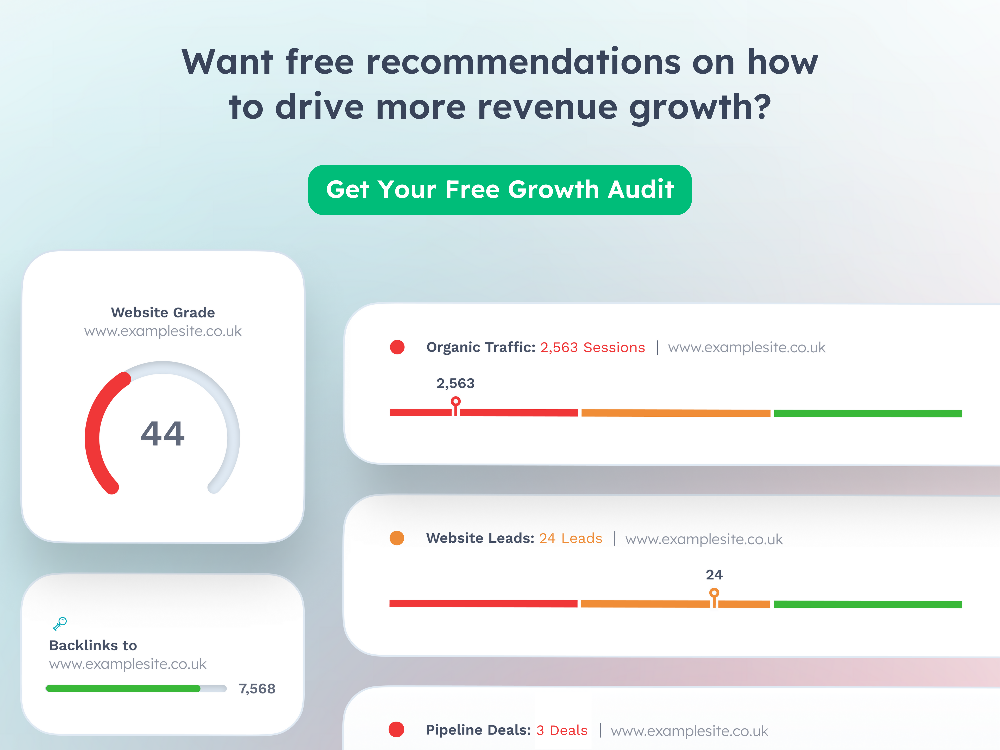A Comprehensive Guide to Getting Started with B2B SaaS Marketing

B2B SaaS marketing is a rapidly evolving field that requires a unique approach compared to traditional marketing strategies. As technology continues to advance, businesses are increasingly relying on software as a service (SaaS) solutions to streamline their operations and improve productivity. In this comprehensive guide, we will explore different aspects of B2B SaaS marketing, from understanding the business models to decoding growth hacking techniques. Whether you’re a seasoned marketer or just starting out in the B2B SaaS industry, this guide will provide you with valuable insights to drive success.
Understanding B2B SaaS Marketing
B2B SaaS marketing encompasses the strategies and tactics used to attract, engage, and convert customers for software products targeting businesses. To effectively market a B2B SaaS product, it is important to understand the unique challenges and opportunities presented in this industry.
When it comes to B2B SaaS marketing, there is a wide range of factors to consider. From understanding the different business models that exist in this industry to recognising the power of serving enterprise clients, there are various aspects that can contribute to the success of your marketing efforts.
Exploring Different Business Models in B2B SaaS
Before diving into the world of B2B SaaS marketing, it is crucial to have a solid understanding of the different business models that exist in this industry. From subscription-based pricing models to usage-based models, each approach has its own advantages and considerations.
Subscription-based pricing models, for example, offer a recurring revenue stream and can provide a predictable cash flow for your business. On the other hand, usage-based models allow customers to pay based on their actual usage, providing flexibility and potentially attracting a wider range of customers.
By studying successful B2B SaaS companies and their chosen business models, you can gain valuable insights into what works and what doesn’t. This knowledge can help you make informed decisions when it comes to pricing, packaging, and positioning your product in the market.
The Power of Enterprise B2B Software Specialists
In the B2B SaaS industry, specialising in serving enterprise clients can be a lucrative strategy. Enterprises often have complex requirements and demand robust software solutions. By becoming an expert in serving the enterprise market, you can command higher prices and attract larger customers.
When targeting enterprise clients, it is important to understand their unique needs and pain points. This requires in-depth market research and a deep understanding of the industry verticals you are targeting. By tailoring your product and marketing efforts to meet the specific needs of enterprise clients, you can position yourself as a trusted partner and gain a competitive edge.
Additionally, enterprise clients can provide valuable references and case studies to showcase the capabilities of your product. Their endorsement can go a long way in building credibility and attracting new customers. By delivering exceptional service and continuously innovating your product, you can establish long-term relationships with enterprise clients and create a strong foundation for growth.
Unleashing the Potential of Hybrid B2B Tech Businesses
Hybrid B2B tech businesses, which combine software products and services, are gaining popularity in the B2B SaaS industry. By offering a comprehensive solution that includes both software and services, you can differentiate your product and provide additional value to customers.
For example, offering implementation services alongside your software can help customers overcome any challenges they may face during the onboarding process. This hands-on support can increase customer satisfaction and reduce churn rates. Additionally, providing ongoing training and support can help customers maximize the value they get from your product, leading to higher retention rates.
This hybrid approach can also lead to higher customer satisfaction and retention rates. By combining the benefits of software and services, you can create a seamless experience for your customers and address their needs comprehensively. This can result in stronger customer loyalty and advocacy, ultimately driving growth for your business.
In conclusion, B2B SaaS marketing is a multifaceted discipline that requires a deep understanding of the industry, the target audience, and the unique challenges and opportunities that come with it. By exploring different business models, specialising in serving enterprise clients, and unleashing the potential of hybrid B2B tech businesses, you can position your product for success in the competitive B2B SaaS market.

Effective Lead Generation Strategies for B2B SaaS
Generating high-quality leads is crucial for the success of any B2B SaaS business. In this section, we will explore various lead generation strategies that can help you attract and convert potential customers for your software product.
One effective strategy for lead generation in the B2B SaaS industry is leveraging YouTube and podcasts. These video and audio content platforms offer unique opportunities for marketing your software product. By creating engaging and informative content on these platforms, you can establish your brand as a thought leader in the industry and attract a wide range of potential customers.
YouTube, with its vast user base and global reach, provides an excellent platform for showcasing your software product’s features and benefits. You can create tutorial videos, product demos, and customer success stories to demonstrate the value your product brings to businesses. Additionally, YouTube allows you to optimise your videos with relevant keywords and tags, making it easier for potential customers to discover your content.
Podcasts, on the other hand, offer a more intimate and conversational approach to reaching your target audience. By hosting a podcast related to your industry or software niche, you can engage with industry experts, share insights, and discuss emerging trends. This not only helps in building credibility for your brand but also attracts potential customers who are interested in the topics you cover.
However, it is important to understand the preferences of your target audience and align your content strategy accordingly. Conducting market research and analysing the demographics and interests of your potential customers can provide valuable insights into the type of content they are most likely to engage with on these platforms.
The Role of Inbound Marketing in B2B SaaS Lead Generation
Inbound marketing plays a significant role in B2B SaaS lead generation. This approach focuses on attracting customers through valuable content and personalised experiences. By creating informative blog posts, ebooks, and whitepapers, you can generate qualified leads who are actively seeking solutions to their business challenges.
One of the key aspects of inbound marketing is creating content that addresses the pain points and challenges faced by your target audience. By understanding their needs and providing valuable insights and solutions, you can position your brand as a trusted advisor and attract potential customers who are actively searching for a software solution like yours.
Implementing strategies such as search engine optimization (SEO) and social media marketing can further amplify the reach of your content and attract a larger pool of prospective customers. By optimizing your website and content for relevant keywords, you can improve your search engine rankings and increase organic traffic to your site. Similarly, leveraging social media platforms to promote your content and engage with your audience can help in building brand awareness and driving traffic to your website.
Furthermore, inbound marketing allows you to nurture leads through personalised experiences. By implementing marketing automation tools, you can create targeted email campaigns, lead scoring systems, and personalised landing pages to deliver tailored content to your leads at different stages of the buyer’s journey. This helps in building relationships with potential customers and increasing the chances of converting them into paying customers.
In conclusion, leveraging YouTube and podcasts, as well as implementing inbound marketing strategies, can significantly enhance your lead generation efforts in the B2B SaaS industry. By creating valuable content, optimizing it for search engines, and providing personalised experiences, you can attract and convert potential customers for your software product.
Winning Tactics for B2B SaaS Start-up Marketing
Start-ups in the B2B SaaS industry face unique challenges when it comes to marketing their products. Limited budgets and resources require creative and cost-effective strategies to gain traction in the market. In this section, we will explore winning tactics that can help B2B SaaS start-ups achieve marketing success.
One winning tactic for B2B SaaS start-ups is to leverage content marketing. By creating high-quality and informative content, start-ups can establish themselves as thought leaders in their industry. This can be done through blog posts, whitepapers, case studies, and e-books. By providing valuable insights and solutions to common pain points, start-ups can attract and engage their target audience.
Another effective tactic is to build strong relationships with industry influencers. These influencers have a significant following and can help promote a start-up’s products or services to a wider audience. By collaborating with influencers through guest blog posts, interviews, or social media partnerships, start-ups can tap into their existing network and gain credibility in the market.
Furthermore, B2B SaaS start-ups can benefit from implementing a targeted email marketing strategy. By segmenting their email list based on customer preferences and behaviours, start-ups can deliver personalised and relevant content to their subscribers. This can help nurture leads, increase engagement, and ultimately drive conversions.
Additionally, social media can play a crucial role in the marketing efforts of B2B SaaS start-ups. By leveraging platforms such as LinkedIn, Twitter, and Facebook, start-ups can connect with their target audience, share valuable content, and build brand awareness. Social media also provides an opportunity for start-ups to engage in conversations with their customers, gather feedback, and address any concerns or questions.
Moreover, B2B SaaS start-ups can consider hosting webinars or virtual events to showcase their expertise and connect with potential customers. These online events allow start-ups to demonstrate their product’s features and benefits, provide live demonstrations, and answer questions in real-time. Webinars and virtual events can be a powerful tool for lead generation and establishing credibility in the industry.
Lastly, B2B SaaS start-ups should not underestimate the power of customer testimonials and case studies. By showcasing success stories and positive experiences from satisfied customers, start-ups can build trust and credibility with their target audience. Testimonials and case studies provide social proof and demonstrate the value and effectiveness of a start-up’s product or service.
In conclusion, B2B SaaS start-ups can achieve marketing success by implementing a combination of winning tactics. By leveraging content marketing, building relationships with influencers, implementing targeted email marketing, utilising social media, hosting webinars or virtual events, and showcasing customer testimonials, start-ups can effectively promote their products and services, gain traction in the market, and ultimately drive business growth.
Decoding Growth Marketing in the B2B SaaS Industry
Growth marketing is a data-driven and iterative approach to marketing that focuses on rapid experimentation and growth. In the B2B SaaS industry, growth marketing can be a powerful tool to acquire customers, increase revenue, and achieve sustainable long-term growth.
When it comes to the B2B SaaS industry, growth marketing plays a crucial role in driving success. With the ever-increasing competition and evolving customer demands, companies need to adopt innovative strategies to stay ahead of the game. Growth marketing provides a solution by combining data analysis, customer insights, and creative marketing tactics to drive growth and achieve business objectives.
One of the key aspects of growth marketing in the B2B SaaS industry is its data-driven nature. By leveraging data analytics and metrics, companies can gain valuable insights into customer behavior, preferences, and trends. This information can then be used to optimise marketing campaigns, personalize customer experiences, and make data-backed decisions. With the right data in hand, companies can identify growth opportunities, target the right audience, and allocate resources effectively.
Another important element of growth marketing in the B2B SaaS industry is its focus on rapid experimentation. Unlike traditional marketing approaches that rely on long-term planning and execution, growth marketing thrives on agility and adaptability. Companies constantly test and iterate their marketing strategies, campaigns, and messaging to find what works best for their target audience. This iterative approach allows for quick adjustments and optimisations, ensuring that marketing efforts are always aligned with customer needs and market trends.
Furthermore, growth marketing in the B2B SaaS industry emphasises sustainable long-term growth. While short-term wins are important, growth marketers understand the value of building lasting customer relationships and driving customer loyalty. By delivering exceptional customer experiences, providing valuable content, and continuously adding value to their products or services, companies can foster customer loyalty and drive customer advocacy. This not only leads to increased customer retention but also attracts new customers through positive word-of-mouth and referrals.
In conclusion, growth marketing in the B2B SaaS industry is a powerful approach that combines data-driven insights, rapid experimentation, and a focus on sustainable long-term growth. By leveraging these strategies, companies can acquire customers, increase revenue, and stay ahead of the competition in the ever-evolving B2B SaaS landscape.
Demystifying Growth Hacking in B2B SaaS
Growth hacking refers to unconventional and innovative marketing strategies to achieve rapid growth on a limited budget. It is a term that has gained popularity in recent years, especially in the startup world. While growth hacking is often associated with start-ups, it can also be applied to B2B SaaS companies looking to scale their business.
When it comes to B2B SaaS, growth hacking can be a game-changer. With the right strategies and tactics, you can drive exponential growth for your product, even with limited resources. One of the key aspects of growth hacking in B2B SaaS is focusing on customer acquisition and retention.
Viral marketing is one of the most effective growth hacking tactics for B2B SaaS companies. By creating content that is highly shareable and encourages users to spread the word, you can reach a wider audience and attract more potential customers. This can be achieved through various channels such as social media, email marketing, and content marketing.
Referral programs are another powerful growth hacking technique for B2B SaaS companies. By incentivising your existing customers to refer your product to others, you can tap into their networks and acquire new customers at a lower cost. This not only helps in expanding your customer base but also builds trust and credibility for your brand.

Conversion rate optimisation (CRO) is a crucial aspect of growth hacking in B2B SaaS. By analysing user behaviour, conducting A/B testing, and optimising your website or landing pages, you can increase the percentage of visitors who take the desired action, such as signing up for a free trial or making a purchase. This can have a significant impact on your revenue and overall growth.
Another growth hacking strategy for B2B SaaS companies is to leverage partnerships and collaborations. By teaming up with complementary businesses or influencers in your industry, you can tap into their existing customer base and gain exposure to a wider audience. This can help in driving more traffic to your website and generating leads.
Furthermore, personalisation is key in growth hacking for B2B SaaS. By tailoring your marketing messages and product offerings to specific target segments, you can increase engagement and conversion rates. This can be achieved through various means such as personalized emails, customized landing pages, and targeted advertising campaigns.
It is important to note that growth hacking is not a one-size-fits-all approach. What works for one B2B SaaS company may not necessarily work for another. It requires experimentation, data analysis, and continuous optimization to find the right growth hacking strategies that work for your specific business and target audience.
In conclusion, growth hacking can be a powerful tool for B2B SaaS companies looking to scale their business. By employing tactics such as viral marketing, referral programs, conversion rate optimization, partnerships, and personalization, you can drive rapid growth and achieve your business goals. So, embrace the power of growth hacking and unlock the full potential of your B2B SaaS product.
The Role of a Growth Hacker in B2B SaaS Companies
A growth hacker is responsible for driving rapid and sustainable growth for a B2B SaaS company. This role requires a deep understanding of marketing, analytics, and product development. A skilled growth hacker can identify untapped opportunities, optimise conversion funnels, and implement data-driven experiments to unlock the full growth potential of a B2B SaaS product.
Unveiling the Marketing Strategy of Slack
Slack, a leading B2B SaaS company, has achieved remarkable success in a highly competitive market. By analyzing their marketing strategy, we can gain valuable insights into the key tactics and approaches that have contributed to their growth. From their customer-centric approach to their innovative pricing model, there are many lessons that can be applied to other B2B SaaS marketing efforts.
Building a Software Product for Sustainable Growth
The success of a B2B SaaS product depends on more than just marketing strategies. In this section, we will explore the key factors to consider when building a software product for sustainable growth.
Creating Lasting Brand Residue in B2B SaaS Products
A strong brand is crucial for long-term success in the B2B SaaS industry. By developing a unique brand personality and positioning your product effectively, you can differentiate yourself from competitors and build customer loyalty. Investing in brand-building activities such as content marketing and influencer partnerships can also contribute to sustainable growth.
Harnessing the Power of Facebook Ads for Ad Recall Lift
Facebook Ads can be a powerful tool to increase brand awareness and drive conversions for B2B SaaS products. By targeting specific audience segments and optimizing your ad campaigns, you can achieve higher ad recall lift and maximise the return on your advertising investment. It is important to constantly monitor and refine your Facebook Ads strategy to ensure optimal results.
Analysing the Marketing Tactics of Dropbox
Dropbox, a popular cloud storage and collaboration platform, has successfully grown its user base through a variety of marketing tactics. By analysing their strategies, we can gain valuable insights into how they have leveraged content marketing, referral programs, and partnerships to attract and retain customers. These tactics can serve as inspiration for other B2B SaaS companies looking to achieve similar success.
Going Viral: The Power of Digital Marketing in B2B SaaS
Digital marketing offers countless opportunities for B2B SaaS companies to go viral and achieve widespread exposure. From well-crafted social media campaigns to engaging video content, there are many ways to generate buzz and attract attention. By understanding the key principles of viral marketing and leveraging the right channels, you can amplify the reach of your B2B SaaS product and drive exponential growth.
Recap and Key Takeaways
Throughout this comprehensive guide, we have explored various aspects of B2B SaaS marketing, from understanding business models to implementing growth hacking strategies. It is important to continually adapt and evolve your marketing efforts in response to changing market dynamics and customer preferences. By leveraging the right tactics and staying ahead of the competition, you can position your B2B SaaS product for long-term success in the dynamic and ever-growing SaaS industry.

Reach Your Revenue Goals. Grow MRR with Gripped.
Discover how Gripped can help drive more trial sign-ups, secure quality demos with decision makers and maximise your marketing budget.
Here's what you'll get:
- Helpful advice and guidance
- No sales pitches or nonsense
- No obligations or commitments



Book your free digital marketing review
Other Articles you maybe interested in
What B2B SaaS Founders Want from their CMOs – Thoughts and Analysis 2025
B2B SaaS founders are typically driven by product innovation and business growth. They launch companies to solve pressing customer problems and capture new markets, which makes achieving product-market fit and scaling revenue top priorities. In founder surveys, hiring the right team consistently ranks as a major concern – for example, First Round Capital found that…
The 100 Best SaaS Websites Examples to Get Inspiration (Updated for 2025)
It’s undeniable that a well-executed website is a deal breaker for a customer looking to invest in a B2B SaaS brand. Getting the balance between eye-catching content and practicality is no small feat, but it will make all the difference in attracting potential customers — something the best SaaS websites on this list have nailed. …
A Practical Guide to CAC and LTV for B2B SaaS Marketers
For B2B marketers understanding key metrics like Customer Acquisition Cost (CAC), CAC Payback Period, Customer Lifetime Value (LTV), and the LTV:CAC ratio is crucial for planning, managing and executing in way that delivers sustainable growth. These metrics reveal how much it costs to earn a customer, how valuable that customer is over time and how…


